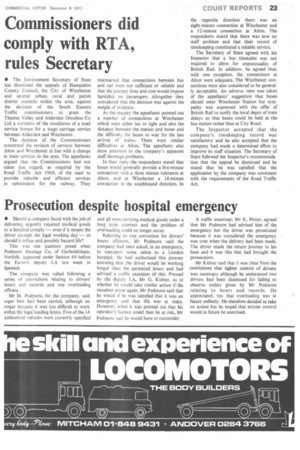Prosecution despite hospital emergency
Page 25

If you've noticed an error in this article please click here to report it so we can fix it.
• Should a company faced with the job of delivering urgently required medical goods to a hospital comply — even if it means the driver exceeds the legal working day — or should it refuse and possibly hazard life?
This was one question posed when Podmore Haulage Co, of Garboldisham, Norfolk, appeared under Section 69 before the Eastern deputy LA last week in Ipswich.
The company was called following a series of convictions relating to drivers' hours and records and one overloading offence.
Mr M. Podmore, for the company, said sugar beet had been carried, although no Longer because it was too difficult to work within the legal loading limits. Five of the 14 authorized vehicles were currently specified and all were carrying medical goods under a long term contract and the problem of overloading could no longer occur.
Referring to one conviction for drivers' hours offences, Mr Podmore said the company had been asked, in an emergency, to transport some saline to a London hospital. He had authorized this journey knowing that the driver would be Working longer than the permitted hours and had advised a traffic examiner of this. Pressed by the deputy LA, Mr G. Kidner, as to whether he would take similar action if the situation arose again, Mr Podmore said that he would if he was satisfied that it was an emergency and that life was at stake. However, when it was pointed out that his operator's licence could then be at risk, Mr Podm ore said he would have to reconsider. A traffic examiner, Mr K. Potter, agreed that Mr Podmore had advised him of the emergency but the driver was prosecuted because it was considered the emergency was over when the delivery had been made. The driver made the return journey to his base and it was this that had brought the prosecution.
Mr Kidner said that it was clear from the convictions that tighter control of drivers was necessary although he understood two drivers had been dismissed for failing to observe orders given by Mr Podmore relating to hours and records. He appreciated. too that overloading was in future unlikely. He therefore decided to take no action but he hoped that stricter control would in future be exercised.








































































































